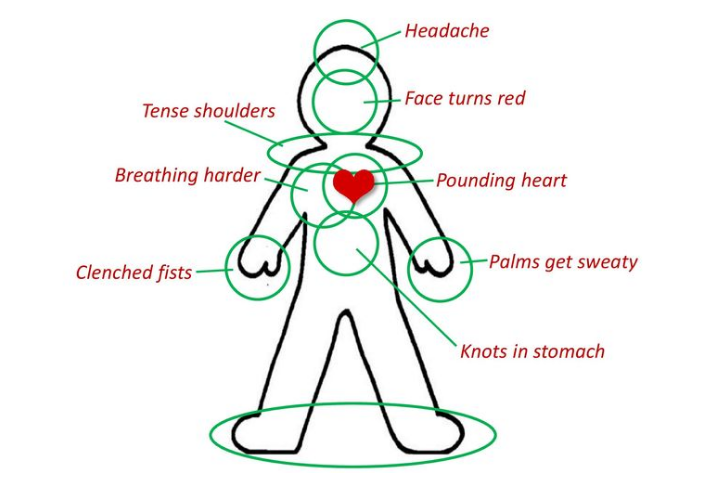-
 Embark on a Journey to Discover India. Your Guide to the Best Places to Visit in India in Every Season (2020)
Embark on a Journey to Discover India. Your Guide to the Best Places to Visit in India in Every Season (2020)
-
 Planning to Visit India's Silicon Valley? Fun Things to Do in Bangalore to Get the True Flavour of this Happening City (2020)
Planning to Visit India's Silicon Valley? Fun Things to Do in Bangalore to Get the True Flavour of this Happening City (2020)
-
 Looking for a Natural Way of Healing Your Body and Rejuvenating Your Soul? Check out the Top Books on Ayurveda to Discover and Adopt the Miracles of This Ancient System of Medicine (2021)
Looking for a Natural Way of Healing Your Body and Rejuvenating Your Soul? Check out the Top Books on Ayurveda to Discover and Adopt the Miracles of This Ancient System of Medicine (2021)
Anger Management is Critical

We are born with lots of emotions, and not all of them are good for us with anger is one of them. We can get angry for a whole lot of occurrences around us but being angry at the drop of a hat is not suitable for having good relations with others. It can also lead to health problems. While anger is a normal feeling and it cannot go away, but you can develop techniques that can help you to manage anger better
While holding back anger can do more harm, you shouldn't get angry at all. For this, managing anger is crucial. Various methods can help you to manage anger better. It can be taking some deep breath, and if you cannot control it yourself, you may opt for therapy.
How Anger Management Can Help?

Better Empathy

It is essential to feel for the other person and understand their behaviour. Most of us fail to do so that enhances the level of anger in us. If you go for therapy, you will understand the importance of showing empathy towards others and reducing the chances of a conflict. Being empathetic can also lead to helping in the other person's problems as their behaviour could also result from some personal issues in their lives.
Strengthens and Maintains Relationships

When you lash out at others in anger, you also tend to lose your friendship with them. It is of no use to be out of favour with some people in our lives. Those with anger management disorders could also be having issues with their friends and relatives. It is essential to develop anger management skills that can help to strengthen bonds with other people. Once you deal with conflicts in a relaxed manner and appreciate the person's perspective, you will also be valued in return.
Communicate Better

Anger arises out of conflicts with others. So, it is essential to be able to communicate better. Once you can control your anger, you will see that you are communicating better with others. A necessary part of anger management is listening to what other people have to say and understand their viewpoints.
It is also essential to hear the other person through, and this also forms an integral quality of a good communicator. When you can control your anger, you have a clear mind and can understand the situation better. Once the points of view are clear in your mind, you will also find it easier to resolve any conflict.
Assist in Career Growth

The workplace is fraught with opposing forces, and very often, you can find yourself in a tight spot. While the stress levels can vary, you may find the going difficult at times with some of your colleagues, not agree with your ideas. There could be other reasons too. It is essential to have a relaxed mind and assess the situation before making any judgment.
The workplace is not the ideal place to vent your anger and can put your career in jeopardy. It is said that a good manager must have excellent anger management skills. Throwing tantrums may make your colleagues view you as having low self-esteem and can go against you during performance reviews.
Lessen Disputes with Others

Those with higher anger management skills are known to have a collaborative way of dealing with various situations. If you can control your anger, it will be easier for you to deal with adverse conditions.
You can keep a cool head and can understand the reasons for the difference in opinion. The difference in opinion will always be there, and you must not take them personally. If you are not angry, you have a calmer mind, allowing you to make better decisions and prevent you from getting into conflicts with others.
Best Tips to Deal with Anger

Workout When Angry

There can be many reasons why you may lose your cool. It is critical to managing your anger, and why not do it with an activity that is good for your health? Set aside your workout sessions when you can vent out your anger and not anywhere else, with an assumption that you will not pick a fight with another person at the gym! It is required that you relax the muscles, and that will, in turn, relax your mind.
Whenever you are exercising, the body releases the endorphin hormones. These hormones are known to ease the pain as well as trigger a positive feeling in the body. Within some time, you will find that your sense of anger has eased away. It is one of the reasons why doing exercises regularly is known to reduce stress and remove depression.
Take Good Care of Yourself

When you are angry, it could lead to more provocation and increase your actions' severity. When you are mad, the last thing you would want to is being unable to control your emotions due to stress or being in an inebriated state. There have been too many similar incidents, and you should refrain from acts. It would be best if you stayed away from alcohol abuse or drug abuse as it can make you do some actions that you wouldn't do otherwise.
You must not fatigue yourself by sleep deprivation and get stressed unnecessary. It is ideal for taking some rest and pondering over it the next day. If you are still unable to stay away from stress, do some meditation, or be engrossed in your hobbies. It is essential to ensure that you do not have background variables like the above to also deal with anger.
Know The Signs

You need to know the signs that you are getting angry. Your heart may be pounding, you may be sweating or maybe raising your voice, or you may be grinding your teeth. These are some of the signs to show that you are crossing the threshold of anger and need to control yourself. It will help you to analyse so that you avoid those activities in the future.
It is not the ideal scenario to blame others for your anger but must introspect and try to find a solution to get away from such scenarios. You must get into any confrontation or start discussing a topic that could incite others. There may be some anger management techniques that you may be learning and could help quell your anger.
Step Away If Feeling Overwhelmed by Anger

When you feel stressed, you can go out for a walk or do some freehand exercises. When you feel flustered during an argument or a dispute, it is better to walk away rather than willing to win it. Staying away is the best idea as it can prevent fueling your anger. But before doing so, always tell yourself that you are only trying to control your anger.
When you are in office, you must schedule timeouts after spending a long time at your workstation. It will help to de-stress yourself that is one of the primary reason to lose your cool. Timeouts are not necessarily for your family, but it can help you recoup yourself and ensure you are within your senses and not losing your cool.
Speak to Someone Trustworthy

When you are angry, it is best to stop talking to the world around you. But it does not mean you have to keep mum. It would be best if you spoke to someone who is the nearest about various aspects of life. It could also be about the scenario you were in that made you angry. You need to express your concerns and discuss with your well-wishers about how to take care of them.
Most of the time, we are too annoyed by our colleagues. It will be helpful to talk about them with some of your colleagues with whom you can share your anguish. If there are none at your workplace with whom you can share your thoughts, you may talk to your family. When discussing the incident with a friend, always keep in mind that you are looking for a solution and hear attentively what the other person has to say. Otherwise, you may start quarrelling again.
A Need to Empathise

It is essential to realise that most of our anger arises from confrontations with others. And when do we confront with others? When we do not understand the reasons why the other person is behaving in that way. We must empathise and know the thought process of the other person. It will help you reason from both angles and will help you to understand the situation better.
When there is an argument you someone is behaving awkwardly, you must ask yourself why the other person would act that way. It is critical to get into the heels of the other person and try to have an idea about the other party's viewpoints.
Try to Forgive

When you are angry, it is essential to assess what has transpired and ensure they do not happen again. Usually, a quarrel starts with both sides disagreeing to arrive at a meaningful conclusion. You must assess the ways why you had to disagree with the other person. In some cases, it could be because of you. You must tell yourself that you should be more transparent with your views.
However, in most cases, we tend to find fault with others. In such a scenario, you should forget the other person and move on. This way, you do not quarrel for too long, and you will not get angry also. Always remember that forgiving is not a virtue of the weak, but a powerful mind.
Find Techniques That Calm You

When you are angry, you must try out every ways and means to calm yourself. You may take a few deep breaths that will soothe your mind. It is essential to know that anger is your enemy and will eat into your daily activities and cause more harm to you. You may use humour to remove the tension and revitalise the environment.
It is crucial to note that you must not have unrealistic expectations from the other person, and you must not be sarcastic. It is also essential to know a few relaxation skills. You must talk to yourself and keep telling to take it easy, as getting angry would only lead to more problems. It is better to calm yourself than regret your actions or the words spoken after a few days.
Don't be Judgemental

When we are angry, we tend to make a false identity of the other person. We expect them to behave in a manner as per our wishes. However, we do not understand that people have their reasons to act in a particular way. Most of the rules you create in your mind for other people are your upbringing or how you do things. These may not match with the world around you, and it is in your best interest to accept it.
The culture in different countries and regions vary to a great extent. You may have your own opinions that could be driven by your values and customs, but you cannot expect the other people you come across to accept them too.
Opt for Therapy When Needed

If you are unable to control your anger regularly, it could lead you to deep trouble. You must look out for such indicators beforehand. Anger related issues are often seen in conjunction with alcohol or substance abuse or other psychological disorders. You must press the panic button if you get into a fight more often or see an increase in arguments with your family.
It is ideal for people with severe anger management disorders to go for therapy, as it is critical to address the various underlying issues that lead to you behaving awkwardly. You will be taught to identify triggers and ways to handle them apart, learning ways to respond to anger constructively. Special attention will be given to meditation and ways to be in a calm state. The ways to exert your feelings will be taught, and the need to use your resources into solving problems will be explained in detail.
-
 Looking for a Natural Way of Healing Your Body and Rejuvenating Your Soul? Check out the Top Books on Ayurveda to Discover and Adopt the Miracles of This Ancient System of Medicine (2021)
Looking for a Natural Way of Healing Your Body and Rejuvenating Your Soul? Check out the Top Books on Ayurveda to Discover and Adopt the Miracles of This Ancient System of Medicine (2021)
-
 Looking for a Calm and Peaceful Vacation in Complete Harmony with Nature? Visit Auroville Pondicherry – The City of Dawn (2020)
Looking for a Calm and Peaceful Vacation in Complete Harmony with Nature? Visit Auroville Pondicherry – The City of Dawn (2020)
-
 Drinking Vodka Tonic or Cosmopolitan Again? Why Stick to the Regulars When There's So Much More to Do with Vodka: 10 Recipes of Cocktails with Vodka That Will Blow Your Mind!
Drinking Vodka Tonic or Cosmopolitan Again? Why Stick to the Regulars When There's So Much More to Do with Vodka: 10 Recipes of Cocktails with Vodka That Will Blow Your Mind!
-
 Sony PlayStation Delivers the Ultimate Gaming Experience. Discover the Top PlayStation Games to Keep Your Loved Ones Enthralled for Hours (2021)
Sony PlayStation Delivers the Ultimate Gaming Experience. Discover the Top PlayStation Games to Keep Your Loved Ones Enthralled for Hours (2021)
-
 Discover the Resplendent Natural Beauty of India. 10 Breathtakingly Beautiful Places to Go Trekking in India That Will Leave You Mesmerised (2021)
Discover the Resplendent Natural Beauty of India. 10 Breathtakingly Beautiful Places to Go Trekking in India That Will Leave You Mesmerised (2021)
Anger Can Be Habitual
“Fools give full vent to their rage, but the wise bring calm in the end.” Anger can become the default way of dealing with problems if it's repeated. If you usually get upset when the problem comes up, anger can quickly become the only way you will deal with it. Players practise becoming better at their sport. It has been said that “Practice makes perfect”. Practice can also make things permanent. The way you practise something is going to be the way to perform it until you actively practice it a different way to change it. Anger is no different. If you establish a pattern of becoming easily angered at every small problem or disagreement, you will cause that behaviour to become permanent.


 Highlight the Best Facets of Your Incomparable Beauty: Discover the Best Face Highlighter Currently Available in India and Everything You Need to Know About Using Face Highlighters for Maximum Effect (2023)
Highlight the Best Facets of Your Incomparable Beauty: Discover the Best Face Highlighter Currently Available in India and Everything You Need to Know About Using Face Highlighters for Maximum Effect (2023)
 Forget the Blemishes and Get that Picture Perfect Flawless Radiance on Your Face: Check out the Best Foundations for Oily Skin Currently Available in India and Everything You Need to Know About Makeup Foundations (2023)
Forget the Blemishes and Get that Picture Perfect Flawless Radiance on Your Face: Check out the Best Foundations for Oily Skin Currently Available in India and Everything You Need to Know About Makeup Foundations (2023)
 Make Your Presence Felt Wherever You Go: Discover the Best Perfumes Under 2000 for Both Men and Women to Announce Your Arrival and Make Any Occasion Memorable (2023)
Make Your Presence Felt Wherever You Go: Discover the Best Perfumes Under 2000 for Both Men and Women to Announce Your Arrival and Make Any Occasion Memorable (2023)
 Protect Your Oily Skin from the Harmful Rays of the Sun: Discover the Best Gel Based Sunscreens for Oily Skin and Everything You Need to Know Before Buying One (2023)
Protect Your Oily Skin from the Harmful Rays of the Sun: Discover the Best Gel Based Sunscreens for Oily Skin and Everything You Need to Know Before Buying One (2023)
 Minor Blemishes and Wrinkles Affecting Your Confidence? Check out the Best BB Creams to Conceal Your Worries and Nourish Your Skin to Restore the Healthy, Radiant and Glowing Complexion Back Again (2023)
Minor Blemishes and Wrinkles Affecting Your Confidence? Check out the Best BB Creams to Conceal Your Worries and Nourish Your Skin to Restore the Healthy, Radiant and Glowing Complexion Back Again (2023)
